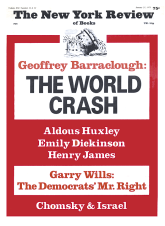In response to:
An International Episode from the November 14, 1974 issue
To the Editors:
Naturally a reviewer has a right to express his disagreement with or dislike for a book, but Irvin Ehrenpreis’s review of Stephen Spender’s Love-Hate Relations: English and American Sensibilities [NYR, November 14] is so one-sided in its emphases and omissions that a short protest seems called for. It’s partly a matter of tone: “our visitors,” including, the context suggests, Mr. Spender, “now cling to their moral integrity and reject our wealth and corruption for the sake of a purer element.” I can’t find any such sanctimoniousness in the book. Nor is Spender so naive as to wish “to establish a frame of moral and social principles from which an Anglo-American culture might flourish.” Nor is it “bizarre” of Spender to speak of American writers studying the past “from the outside”: he explains what he means and offers examples. Nor is “the drift of Love-Hate Relations” “that Americanization has polluted English”; there is ample recognition in the book of the vitalizing effect of American poets—“the bridge-builders between past and present”—in this island.
I suppose Mr. Ehrenpreis was looking for a different kind of book, more “scholarly” and more detailed; but he might have recognized the use Spender makes of the terms he chooses to use, such as “subjective America: objective Europe,” in charting part at least of an intricate relationship. I for one find aperçus worth remembering on particular authors (Whitman, James, Pound…), together with a kind of tentative and unassertive wisdom that is a welcome change from the assertiveness of so much literary criticism: such, for example, as the splendid passage (p.37) on the effects of a “language of diagnoses and cures”—“all the unanswerabilities are taken out of their separate contexts of separate past cultures and disappear into contemporary explanations.” Of course Mr. Ehrenpreis can point to places where the argument needs to be more firm and more developed. But tone and omissions together make the review not only ungenerous but heavily lopsided—more so than one expects from the NYRB.
L. C. Knights
Cambridge, England
Irvin Ehrenpreis replies:
So far from desiring a more “scholarly” book, I looked for one that might be read with confidence and ease by those who make no profession of literary studies. The scholar will not be misled when Henry James is described as lecturing at Bryn Mawr in 1907, for he will know James was not then in this country. If Mr. Spender gives Whitman a book called Cadmus the scholar will easily identify it as Calamus. When Virginia Woolf is quoted as saying that “life” changed in 1910, the scholar will know the word was “character.” When Mr. Spender reflects on Lowell’s distinction between “redskins and academics,” the scholar will recognize Rahv’s distinction between redskins and palefaces (confused with a quite different observation by Lowell). Mr. Spender picks up the idea of writers of all periods working together in the same room, and attributes it to Eliot and Virginia Woolf; the scholar will return the engaging fantasy to its creator, E.M. Forster. When disagreements are mentioned between Sidney Hook and “Thomas” Dewey, the scholar will know the name was John Dewey. If the Sacco-Vanzetti case is used to illustrate America’s uniqueness during the slump of the Thirties, the scholar will know it belonged to our boom period, the Twenties. (And so forth.)
The scholar will not be corrupted by the style of a man who speaks of a “rhetoric of mutual intercommentary”; who describes American workers during the Depression as “owners of their own automobiles from which they had been deprived”; who can say, “The French novel was for James the great example in his time of fiction practiced by the French novelists…”; and who delivers himself of the following bit of unassertive wisdom: “All the same, within the context of the whole of human existence on this planet, people may have had in past times a far greater sense of being significantly alive than people have in our time.”
The scholar will not regard a budget of sneers at Ezra Pound as aperçus (e.g., “He was like a man who goes round with his pocket full of tags marked CIVILIZATION which he is prepared to stick on any suitable spot”). The scholar will not deny that Mr. Spender offers some sound remarks on Whitman, James, and Eliot, but he will doubt that they are either original or fresh. As for my characterizations of Mr. Spender’s view of American culture, instead of supporting them with lengthy extracts and easy sarcasm, let me quote from a judge on Mr. Knights’s side—the reviewer for the Times Literary Supplement, who bestowed a panegyric on the book: “America becomes, in the course of this book, the embodiment of life without that continuity [i.e., with the past], life lived entirely in the present: by the end it is not so much a nation as an example of that life that destroys sensibility and drives out art.”
One sympathizes with Mr. Knights’s impulse to defend a poet and critic who has rendered fundamental services to our common literature. But one also recalls occasions when Mr. Knights came to the defense of order, grace, cogency, and truth.
This Issue
January 23, 1975



